Vladimir Lenin facts for kids
Quick facts for kids
Vladimir Ilyich Lenin
Владимир Ильич Ленин |
|
|---|---|

Portrait of Lenin: October 16, 1918
|
|
| Premier of the Russian SFSR | |
| In office 8 November 1917 – 21 January 1924 |
|
| Preceded by | Nobody (Position created) |
| Succeeded by | Alexei Rykov (Joseph Stalin as the party leader) |
| Premier of the Soviet Union | |
| In office 30 December 1922 – 21 January 1924 |
|
| Preceded by | Nobody (Position created) |
| Succeeded by | Alexei Rykov (Joseph Stalin as the party leader) |
| Chairman of the Bolshevik Party | |
| In office 17 November 1903 – 21 January 1924 |
|
| Preceded by | Nobody (Position created) |
| Succeeded by | Joseph Stalin (as General Secretary) |
| Personal details | |
| Born | 22 April 1870 Simbirsk, Russian Empire |
| Died | 21 January 1924 (aged 53) Gorki, Russian SFSR, Soviet Union |
| Nationality | Russian |
| Political party | Bolshevik Party |
| Spouse | Nadezhda Krupskaya |
| Profession | Politician, Revolutionary, Lawyer |
| Signature |  |

Vladimir Ilyich Ulyanov, better known as Vladimir Lenin, (born April 22, 1870 – died January 21, 1924) was a Russian lawyer and a key revolutionary. He led the Bolshevik party and the October Revolution. Lenin became the first leader of the USSR and the government that took power in Russia in 1917. His ideas are known as Leninism.
Contents
Lenin's Early Life
Lenin was born Vladimir Ilyich Ulyanov in Simbirsk, which is now called Ulyanovsk, on April 22, 1870. As a child, people called him Volodya. He was the third of eight children in his family. His father, Ilya Nikolayevich Ulyanov, came from a family of former serfs. Serfs were like peasants who were tied to the land and belonged to a landowner.
Lenin's father worked hard and became a teacher. He studied physics and math at Kazan University. Later, he became a director of schools, helping to open many new schools. This work earned him the Order of Saint Vladimir, which made him a hereditary nobleman. This meant his family would also be considered noble.
Both of Lenin's parents believed in the monarchy. This meant they supported the rule of a king or queen (the Tsar in Russia). Lenin was very close to his sister, Olga. He was competitive but usually admitted when he did something wrong. He loved sports, playing chess, and was excellent at school.
In January 1886, when Lenin was 15, his father died. Soon after, his older brother Alexander joined a group planning to kill the Tsar. Alexander was arrested and executed in May 1887. Even though these events were very sad, Lenin continued to study and finished school at the top of his class.
How Lenin Became a Revolutionary
While studying law in St. Petersburg, Lenin learned about the ideas of Karl Marx and Friedrich Engels. These philosophers from Germany developed a way of thinking called Marxism. In Russia, it was against the law to talk or write positively about Marxism. Because of this, Lenin was arrested and sent to prison in Siberia. Siberia is a very cold and isolated place, making it a harsh punishment.
In 1899, Lenin wrote a book called The Development of Capitalism in Russia. After being released from prison in 1900, he traveled around Europe. He started a Marxist newspaper called Iskra, which means "spark" in Russian. He also became an important member of the Russian Social Democratic Labour Party, or RSDLP.
In 1903, Lenin had a big disagreement with another party leader, Julius Martov. This split the party into two groups. Lenin wanted to create a socialist society right away. Martov believed Russia needed to become a capitalist country first, then slowly move to socialism. Those who agreed with Martov were called Mensheviks (meaning "the minority"). Those who agreed with Lenin were called Bolsheviks ("the majority").
During World War I, Lenin lived in European cities like London, Paris, and Geneva. At the start of the war, a large meeting of left-wing groups, including the Bolsheviks, took place. Many groups argued about whether to support the war. Lenin and the Bolsheviks were among the few who were against the war, based on their Marxist ideas.
The 1917 Revolutions
After Tsar Nicholas II gave up his power during the February Revolution, Lenin returned to Russia. He was still a very important Bolshevik leader. He believed that ordinary workers should start a revolution to overthrow the government that had replaced Nicholas II.
In 1917, some people spread rumors that Lenin was getting money from Germany. This was because he had traveled through Germany to get back to Russia. This made him look bad, as many Russians had died fighting Germany in the war. After a protest in Petrograd called the July Days was stopped by the government, Lenin left Russia and went to Finland to hide and continue his work.
In October 1917, the Bolsheviks, led by Lenin and Trotsky, led a revolution against the government. This was known as the October Revolution. They won, and Russia was declared a socialist country. In November, Lenin was chosen as its new leader.
Lenin as Leader of Russia
Lenin wanted to end World War I for Russia. So, in February 1918, he signed the Treaty of Brest-Litovsk with Germany. This treaty stopped the fighting, but Russia lost a lot of its farming land.
The treaty also angered Germany's other enemies and some Russians who supported the Tsar or the old government. These groups attacked Russia. Lenin made strict rules to send as much food as possible to the Bolshevik soldiers in Russia's new Red Army. This helped them win the war. However, many ordinary people suffered from hunger and disease because of the lack of food.
After the war, Lenin introduced the New Economic Policy. This policy aimed to improve the country and move from capitalism towards socialism. Some private businesses were still allowed, but they were small. Businessmen, called nepmen, could only own small shops, not large factories. Factories and big industries became public property, owned by the workers.
Lenin's Final Years
Lenin became very sick in late 1921. He had headaches and trouble sleeping. Many doctors, including foreign ones, tried to help him. Some thought his illness might be from bullets still in his body from an assassination attempt in 1918. He had surgery in April 1922 to remove them. But his symptoms continued.
In May 1922, Lenin had his first stroke. He temporarily lost his ability to speak and could not move his right side. He slowly recovered and returned to Moscow in October. In December, he had a second stroke, which sadly led to his death. Before he died, Lenin wrote a document called "Lenin's Testament". In it, he suggested that Joseph Stalin should not be the leader of the Communist Party, as he felt Stalin was not suitable for the job.
Lenin's Personal Life
Lenin was married to Nadezhda Krupskaya, who was also a Marxist. They both wished they had children. They enjoyed spending time with their friends' children.
Besides Russian, Lenin could speak and read French, German, and English. He liked to stay fit and often exercised. He enjoyed cycling, swimming, hunting, and hiking in the mountains. He also loved pets, especially cats. Lenin lived a simple life and did not care much for fancy things.
After Lenin's Death
The city of St. Petersburg was renamed Petrograd in 1914. After Lenin died in 1924, it was renamed Leningrad in his memory. When the Soviet Union ended in 1991, the city was again named St. Petersburg, which it is still called today.
Lenin had said he wanted to be buried next to his mother. However, after he died, Joseph Stalin allowed people to view his body. So many people came that they decided not to bury him. Instead, they preserved his body. A special building called the Lenin Mausoleum was built in Red Square, Moscow, where people could see his body. Many Russians and tourists still visit it today.
Images for kids
-
Lenin was influenced by the ideas of Karl Marx.
-
A one rouble coin made in 1970 to honor 100 years since Lenin's birth.
-
A statue of Lenin in East Berlin, East Germany (removed in 1992).
See also
 In Spanish: Lenin para niños
In Spanish: Lenin para niños























